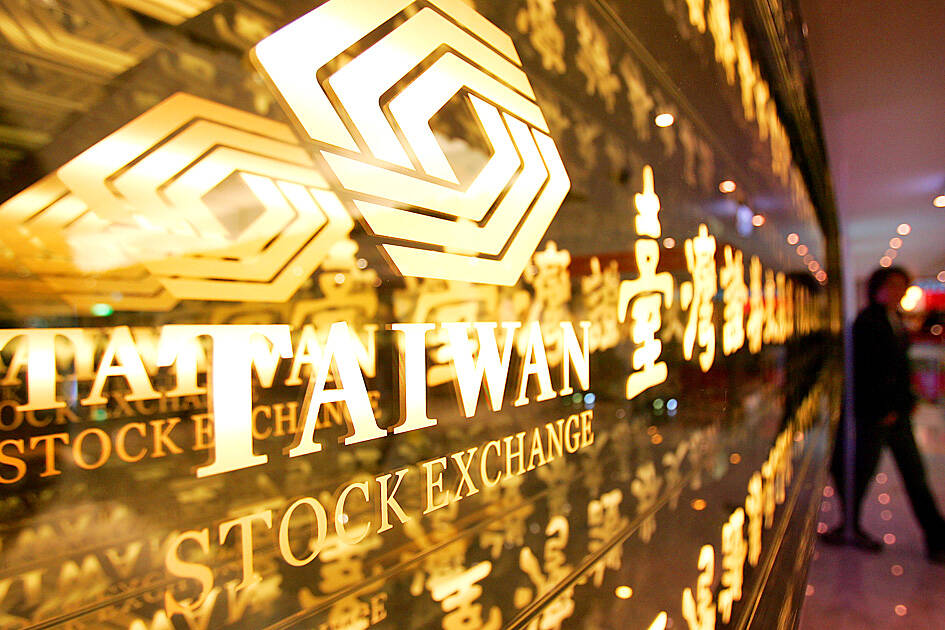Listed companies’ gains from overseas investments excluding China hit a 10-year high in the first half of the year, data released by the Financial Supervisory Commission (FSC) on Tuesday last week showed.
The firms made a combined profit of NT$624.8 billion (US$20.24 billion) in the first half, up NT$48.5 billion, or 8.42 percent, from a year earlier, because of rising shipping rates and robust demand for chips, it said.
The companies cover 724 firms listed on the Taiwan Stock Exchange and 561 companies on the Taipei Exchange, with the shipping, semiconductor and electronic component sectors reporting the largest gains, it said.

Photo: Maurice Tsai, Bloomberg
Benefiting from high freight rates, shipping companies reported a combined profit of NT$285 billion from their overseas investments, up 86.27 percent from a year earlier, while semiconductor firms posted a profit of NT$65.5 billion, up 34.5 percent annually, and electronic components suppliers made NT$84.9 billion in profit, up 5.47 percent, the data showed.
Accumulated overseas investments grew to NT$7.45 trillion as of the end of June, up by NT$307.2 billion from the end of last year, due to mergers and acquisitions and capital injections into foreign subsidiaries, the commission said.
Most new overseas investments were carried out by semiconductor companies, it said.
Meanwhile, listed companies reported a combined profit of NT$203.8 billion from their Chinese investments in the first six months, down 16.13 percent from a year earlier, but still the second-highest for the same period over the past decade, commission data showed.
The companies comprise 679 firms listed on the Taiwan Stock Exchange and 519 firms on the Taipei Exchange, the FSC said.
The commission attributed the decrease in Chinese investment gains to a disruption in the supply chain, especially for the computer, plastic and cement sectors, as well as to weaker market demand and rising raw material prices.
Accumulated Chinese investments rose to NT$2.64 trillion as of the end of June, up by NT$112.9 billion from the end of last year, the data showed.

Anna Bhobho, a 31-year-old housewife from rural Zimbabwe, was once a silent observer in her home, excluded from financial and family decisionmaking in the deeply patriarchal society. Today, she is a driver of change in her village, thanks to an electric tricycle she owns. In many parts of rural sub-Saharan Africa, women have long been excluded from mainstream economic activities such as operating public transportation. However, three-wheelers powered by green energy are reversing that trend, offering financial opportunities and a newfound sense of importance. “My husband now looks up to me to take care of a large chunk of expenses,

SECTOR LEADER: TSMC can increase capacity by as much as 20 percent or more in the advanced node part of the foundry market by 2030, an analyst said Taiwan Semiconductor Manufacturing Co (TSMC, 台積電) is expected to lead its peers in the advanced 2-nanometer process technology, despite competition from Samsung Electronics Co and Intel Corp, TrendForce Corp analyst Joanne Chiao (喬安) said. TSMC’s sophisticated products and its large production scale are expected to allow the company to continue dominating the global 2-nanometer process market this year, Chiao said. The world’s largest contract chipmaker is scheduled to begin mass production of chips made on the 2-nanometer process in its Hsinchu fab in the second half of this year. It would also hold a ceremony on Monday next week to

TECH CLUSTER: The US company’s new office is in the Shalun Smart Green Energy Science City, a new AI industry base and cybersecurity hub in southern Taiwan US chip designer Advanced Micro Devices Inc (AMD) yesterday launched an office in Tainan’s Gueiren District (歸仁), marking a significant milestone in the development of southern Taiwan’s artificial intelligence (AI) industry, the Tainan City Government said in a statement. AMD Taiwan general manager Vincent Chern (陳民皓) presided over the opening ceremony for the company’s new office at the Shalun Smart Green Energy Science City (沙崙智慧綠能科學城), a new AI industry base and cybersecurity hub in southern Taiwan. Facilities in the new office include an information processing center, and a research and development (R&D) center, the Tainan Economic Development Bureau said. The Ministry

ADVERSARIES: The new list includes 11 entities in China and one in Taiwan, which is a local branch of Chinese cloud computing firm Inspur Group The US added dozens of entities to a trade blacklist on Tuesday, the US Department of Commerce said, in part to disrupt Beijing’s artificial intelligence (AI) and advanced computing capabilities. The action affects 80 entities from countries including China, the United Arab Emirates and Iran, with the commerce department citing their “activities contrary to US national security and foreign policy.” Those added to the “entity list” are restricted from obtaining US items and technologies without government authorization. “We will not allow adversaries to exploit American technology to bolster their own militaries and threaten American lives,” US Secretary of Commerce Howard Lutnick said. The entities